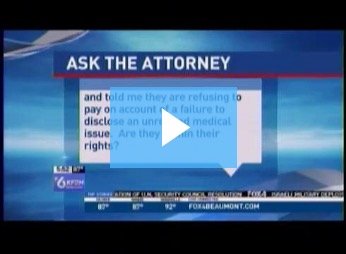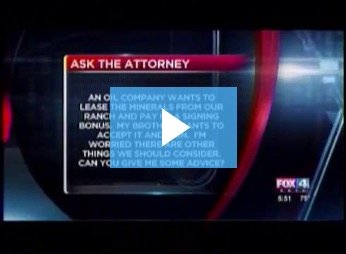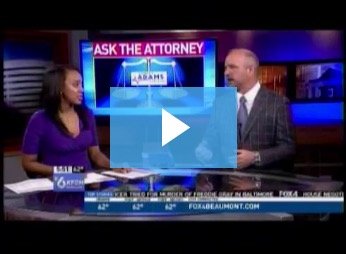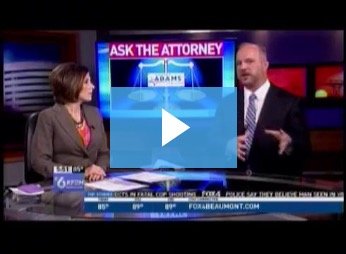Is It Okay to Admit Fault After a Car Crash?

After a car crash, emotions run high. You may feel responsible for the crash and want to apologize, whether out of politeness or guilt or just an instinctive reaction. However, admitting fault at the scene of the crash or during subsequent discussions can have serious consequences for your ability to recover compensation and protect your legal rights.
At Gilbert Adams Law Offices, we understand that automobile collisions can be stressful and intimidating events, but it’s important to know how your actions and statements can affect your case. Below we explore why admitting fault after a car crash is not in your best interest and how Texas law addresses liability. For personalized advice and assistance tailored to your situation after a car crash in Beaumont, Southeast Texas or statewide, contact Gilbert Adams Law Offices to speak with an experienced and successful Texas personal injury lawyer.
The Dangers of Admitting Fault
Admitting fault after a car crash can hurt your case in several ways:
-
Impact on Insurance Claims: Insurance companies use fault determinations to assess liability and payouts. If you admit fault, even if you just say you are sorry but don’t mean to admit fault, this statement can be used against you during settlement negotiations or in court. Your words may give the insurance adjuster a reason to reduce or deny your claim, even if you weren’t to blame.
-
Incomplete Facts: Immediately following a crash, you may not have all the information. There could be underlying factors, such as another driver’s negligence, defective vehicle parts, or hazardous road conditions, that contributed to the accident. By admitting fault too early, you could take on liability that doesn’t reflect the true circumstances of the crash.
-
Legal Implications: In Texas, liability for car crashes is determined based on a modified comparative fault rule. Under this rule, each party’s level of responsibility is assigned a percentage, and your compensation can be reduced according to your degree of fault. However, if you are found to be more than 50% responsible for the accident, you cannot recover any damages. Admitting fault prematurely could tip the scale in the wrong direction, jeopardizing your ability to seek compensation.
What Should You Do After a Car Crash in Texas?
To protect your legal rights after a crash, it’s essential to be cautious with your words and actions. Here’s what you should do:
-
Stay Calm and Exchange Information: After ensuring everyone’s safety and calling for medical assistance if needed, exchange contact and insurance information with the other driver. Avoid making statements about who is responsible for the crash.
-
Gather Evidence: Document the scene by taking photos, gathering witness contact information, and obtaining a copy of the police report. This evidence can help determine the true cause of the crash and protect you from inaccurate fault determinations.
-
Speak Carefully: While it’s natural to feel apologetic, avoid making statements like “I’m sorry” or “It was my fault.” These phrases can be interpreted as admissions of liability and used against you in an insurance claim or lawsuit.
-
Contact a Personal Injury Attorney: One of the most important steps after a car accident is consulting with a personal injury attorney. An experienced lawyer can help you navigate the complexities of the legal system, communicate with insurance companies on your behalf, and ensure that your rights are protected throughout the process.
How Fault Is Determined in Texas Car Crashes
Texas follows a “fault” system when it comes to liability. This means that the person responsible for causing the crash is financially liable for the damages. However, as mentioned earlier, Texas also follows a modified comparative fault rule, which can complicate matters.
If you are partially at fault, your compensation will be reduced by your percentage of fault. For example, if you were 20% responsible for the crash and your damages totaled $100,000, your compensation would be reduced by 20%, leaving you with $80,000. However, if you are found to be 51% or more at fault, you will be barred from recovering any compensation at all.
This is why admitting fault can be so harmful. Even if you believe you are partially responsible, other factors may come into play, and the final determination of fault should be made based on a thorough investigation.
Protecting Your Rights After a Crash
In the aftermath of a crash, your primary focus should be on your physical recovery and ensuring that your legal rights are protected. At Gilbert Adams Law Offices, we have extensive experience representing crash victims in Southeast Texas and across the state. Our firm works to uncover all factors that contributed to the crash, negotiate with insurance companies, and build strong cases on behalf of our clients.
If you’ve been injured in a car crash, don’t let a premature admission of fault limit your ability to recover compensation. Contact Gilbert Adams Law Offices today at 409-835-3000 for a free consultation to discuss your case, and let us help you get the compensation you deserve.










